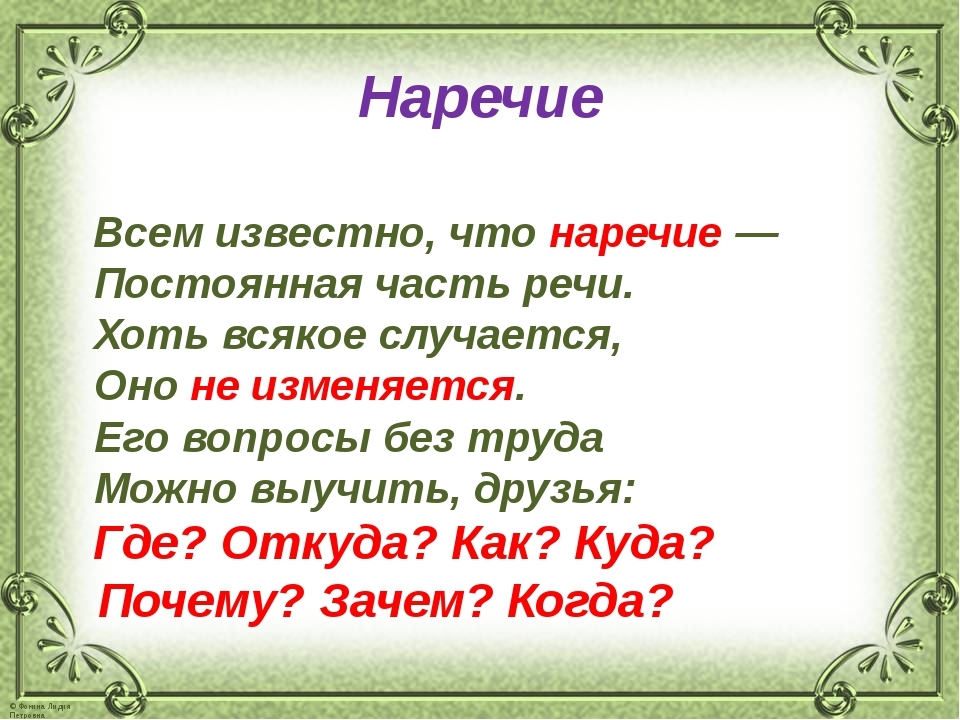What is an adverb, as part of speech? What questions does the adverb answer? What is the difference between an adverb and other parts of speech? Examples of adverbs.
Content
- What is an adverb in Russian, what questions the adverb answers?
- How does an adversary emphasize in the sentence?
- How to determine the adverb: grammatical and morphological signs of adverbs
- Does the adverb mean a sign of action or object?
- What is the difference between the adjective adjective?
- What is the difference between adverbs from other parts of speech?
- What is an adverb: examples
- Adverb, as part of speech: video
“Great and powerful Russian” - we all know about this from the schoolboard. Perhaps that is why the study of this great language is sometimes given to us so hard. What are all its parts of speech only? One of them will be devoted to this material.
What is an adverb in Russian, what questions the adverb answers?

An adverb is an independent part of the speech of the Russian language. In addition to the fact that this part of speech is considered independent, it is also unchanged. Often, adverbs in the sentence are tied to a verb or participle, less often to the name of a noun, adjective or other dialect.
In Russian, adverbs can answer many questions, such as:
- Where? Where?
- How? How?
- When? How long?
- How much?
- Why?
- What for? For what?

Depending on what questions the adverbs answer, they are divided into circumstances and definitive.
The circumstances include:
- Adverbs of time - when? How long? Since what time? (for a long time, constantly, long ago).
- Adverbs of a place - where? Where? Where? (far, everywhere).
- Adverbs of reasons - why? For what reason? (That's why, sulk).
- Adverbs of the goal - why? For what? (intentionally, mocked).
Definitive adverbs include:
- Adverbs of measures and degree - to what extent? How much? How? (excessively, plenty, very).
- Adverbs of the method and image of the action - how is the action performed? How? (In the spring, quiet).
- High -quality adverbs - what are the properties or features of the action? (easy to run, cry softly).
How does an adversary emphasize in the sentence?

- It is necessary to emphasize the adverb in the sentence based on its meaning. The fact is that sometimes an adverb can act as a definition, sometimes in the role of circumstances, and sometimes in the role of a subject, predicate.
- If the adverb in the proposal serves as circumstances, then it must be emphasized by the point with the dash - “after reading the letter, Anna Ivanovna burdenedly”.
- If the adverb in the proposal acts as an inconsistent definition, then it must be emphasized by a wavy line-“breakfast in English” or “hard-to-boiled egg”.
- If the adverb in the proposal acts as a predicate, it is emphasized by two lines - "he is married."
- If the adverb in the sentence serves as a noun, it must be emphasized by one even line - "ours bothers everyone today."
How to determine the adverb: grammatical and morphological signs of adverbs

- The adverb has no kind.
- The adverb has no number.
- The adverb has no case.
- The adverb is not inclined.
- The adverb does not hide.
- Adverbs have no endings.
- High -quality adverbs that have the ending of or -o, and formed from high -quality adjectives, have the degree of comparison.
- Often adverbs depend on verbs, adjectives or other adverbs and form phrases with them.
- Adverbs are signs of action, signs or other objects.
- In the sentence, the adverb most often acts as circumstances.
Does the adverb mean a sign of action or object?

Adverbs most often indicate a sign of action or a sign of another sign, and only occasionally - a sign of an object. Examples:
- A sign of action is to ride high, sleeping badly.
- A sign of another sign is absolutely absurd, so stupid.
- A sign of an object - life separately, reserves for the future.
What is the difference between the adjective adjective?

- An adverb is not a variable part of speech, but the adjective is a variable.
- An adverb is a sign of action, state or other attribute, and the adjective is only a sign of the subject.
- Often in the sentence, the adverb acts as circumstances, and the adjective - only definitions.
- The adverb is directly related to the action, and the adjective - with the subject.
- Adverbs do not have a kind, number, case, and adjectives have.
- The adjective in the sentence can easily be lowered, but the adverb does not.
What is the difference between adverbs from other parts of speech?

- Adverbs differ from unions in that often adverbs are tied to other parts of speech (verbs, other adverbs, participles, nouns or numeral), and alliances are only a connection between the homogeneous members of the sentence, parts of the sentence or several sentences.
- The difference between adverbs and pretexts is that the former do not introduce a case form of the name.
- Adverbs differ from particles in that they do not obey the noun with the pretext, preceding them.
- The adverb does not have dependent and determined words (unlike nouns, adjectives, numerals and pronouns).
- Adverb can often be changed to another adverb, similar in meaning.
What is an adverb: examples

In this subparagraph, we will consider examples of adverbs displaying the degree of comparison of this part of speech:
- Simple comparative degree -it turns out by joining the suffix -e, -y, -e, -he: oily -fat, fatter; Softly softer; Less - less.
- Comparative comparative degree - it turns out by strengthening the adverbs more or less: funny - less funny; Heavier - heavier.
- The component is excellent - is formed by supplementing the initial form of the adverb with words of the most, the least, or simple comparative degree - the words of all, everything: scary - most (the least) scary; The cooler is the cooler (all).







